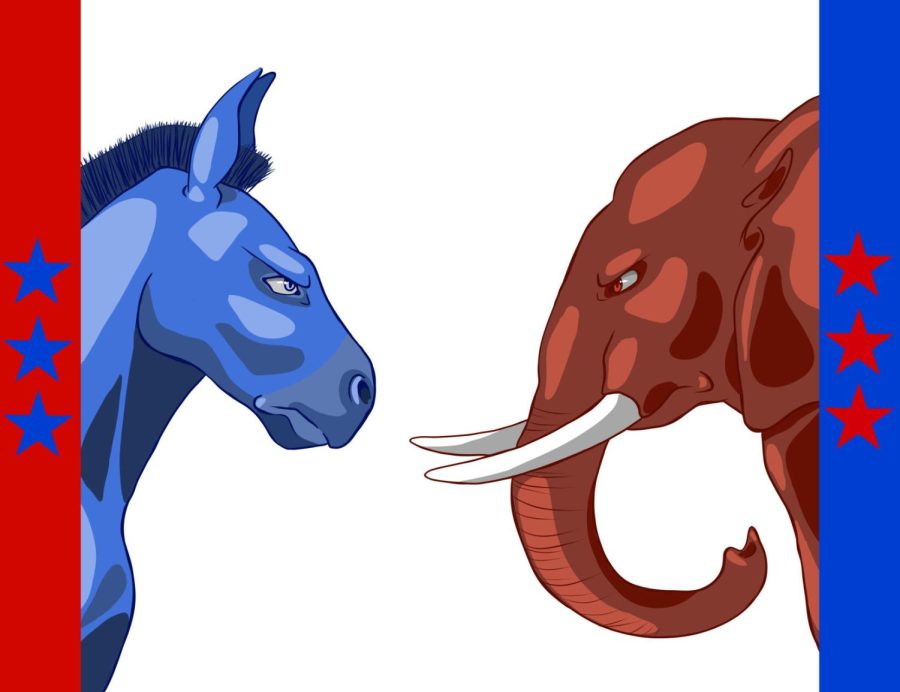The Case for a United States Without Political Parties
The Case for a United States Without Political Parties
October 14, 2020
It’s no secret that politics has made its way into the spotlight in recent years, this year being no exception, as tensions between President Donald Trump and former Vice President Joe Biden grow to a boiling point with Election Day being a few weeks away. As I’ve sat through and watched the presidential debates, as well as read articles about each of the candidates, I couldn’t help but think to myself, “Would the United States be better off without political parties?” Absolutely.
This could have been a reality, as the United States was on track to being a “partyless country.” Our first president, George Washington, is the only one to not have been affiliated with a political party, as he greatly opposed the party system. He had hoped that the United States would stray away from the idea of political parties and even went through great lengths to warn the American people about the negative impacts it can have on the country. In his Farewell Address, he discouraged a party system in fear that it would only cause unnecessary conflict and division in the country. His fears were realized as the country has now seen these negative impacts come full circle — especially notable this year.
If we had heeded Washington’s wisdom, I believe that many people would give more thought into who they choose to support and who best represents their personal values rather than solely undermining another political faction. Having no political parties eliminates bias because if the parties are gone, so are the stereotypes and general labels that come with them. For instance, the debate between Trump and Biden further emphasized the great division between being a Democrat and Republican and highlighted these differences in the form of name calling, personal attacks and bickering. Meanwhile, important policy information was on the back burner. This is not what an election should turn into, because it is, at its core, a battle of ideas between candidates for the overall betterment of the country. Eliminating political bias would allow for voters to examine a candidate’s policies on his or her own merit rather than forming an automatic opinion with no real thought given to either side.
Additionally, getting rid of the political party system in the United States would allow for politics as a whole to be more inviting to the average American. In today’s political climate, the realm of political discourse usually carries an unfriendly environment that can lead to unneeded animosity between people who simply want the best for the future of the country. It can also prove overwhelming for the person who doesn’t know much about politics and could lead to intimidation that steers potential voters away from making informed decisions or even voting at all. In a partyless America, voters would not have to fear facing scrutiny for siding with one party and could simply vote based on their judgements of a candidate’s policies and competence.
I have noticed this year that many issues our country is facing are being treated as political tools to aid in one side beating the other. The COVID-19 pandemic should not be a political issue. Racism and injustice should not be a political issue. The looming threat of climate change should not be a political issue. It saddens me that politics has turned into a competition, and basic morality is ignored in favor of “winning” against the other side. These problems should not be a byproduct of “playing politics,” as these are humanity issues that transcend political affiliations.
I know that this reality is extremely unlikely to happen in the near future. Even so, there is a way to reduce its negative impacts on society. We need to avoid the black and white, or in this case, red vs. blue, thinking and vote for a candidate’s policies rather than solely what party he or she belongs to. While it is not an easy task, it is indeed possible for us to reject political biases and stereotypes, and to make informed and thoughtful decisions. We all may have differing views on topics, but at the end of the day, we all should want what’s best for the United States. I truly believe that changing our way of thinking when it comes to voting will create a country that lives up not only to its name, but also to one of its main founding principles: unity.


